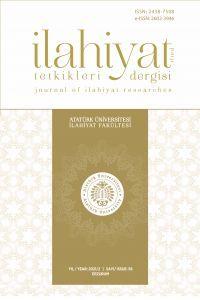Felsefî Kelam ve Ahlâk Felsefesi Bağlamında Kötülük Problemi: Nasîruddin Tûsî Merkezli Bir Analiz
The Evil Problem in the Context of Philosophical Theology and Ethic: An Analysis Centered on Nasr ad-Din Tusi
Author(s): Anar GafarovSubject(s): Ethics / Practical Philosophy, Islam studies, Middle-East Philosophy, Philosophy of Religion
Published by: Atatürk Üniversitesi İlahiyat Fakültesi
Keywords: Theology; Ethics; Tūsī; Evil; Divine Justice;
Summary/Abstract: Natural catastrophes and other bad events faced by humankind have drived Tūsī to investigate the problem of evil and to come up with a logical and consistent explanation to the problem of God's justice. The philosopher's grounding on this axis is actually extremely important in terms of problematising the curiosity about the source of life, the place of man in the realm of existence, and according to which philosophy and principles of life will be determined, and to make sense of life. The purpose of the study is to reveal Tūsī's thoughts and approaches on the problem of evil in a compact way and to determine to what extent he was influenced by his predecessors in this regard, and whether he has a unique contribution, and to justify how the philosopher reconciles natural calamities and other bad events with the justice of God. The main thesis of the study is that Tūsī generally continues the tradition of Mu‘tazila-Shia and Islamic Peripatetic philosophers’ views and approaches regarding the problem of evil. It can be said that although Tūsī generally adopts the Mu’tazilian approach regarding whether or not bad deeds can be attributed to God, he partially admits the Ash’arī line and a synthesist attitude.
Journal: İlahiyat Tetkikleri Dergisi
- Issue Year: 2021
- Issue No: 56
- Page Range: 143-167
- Page Count: 25
- Language: Turkish

